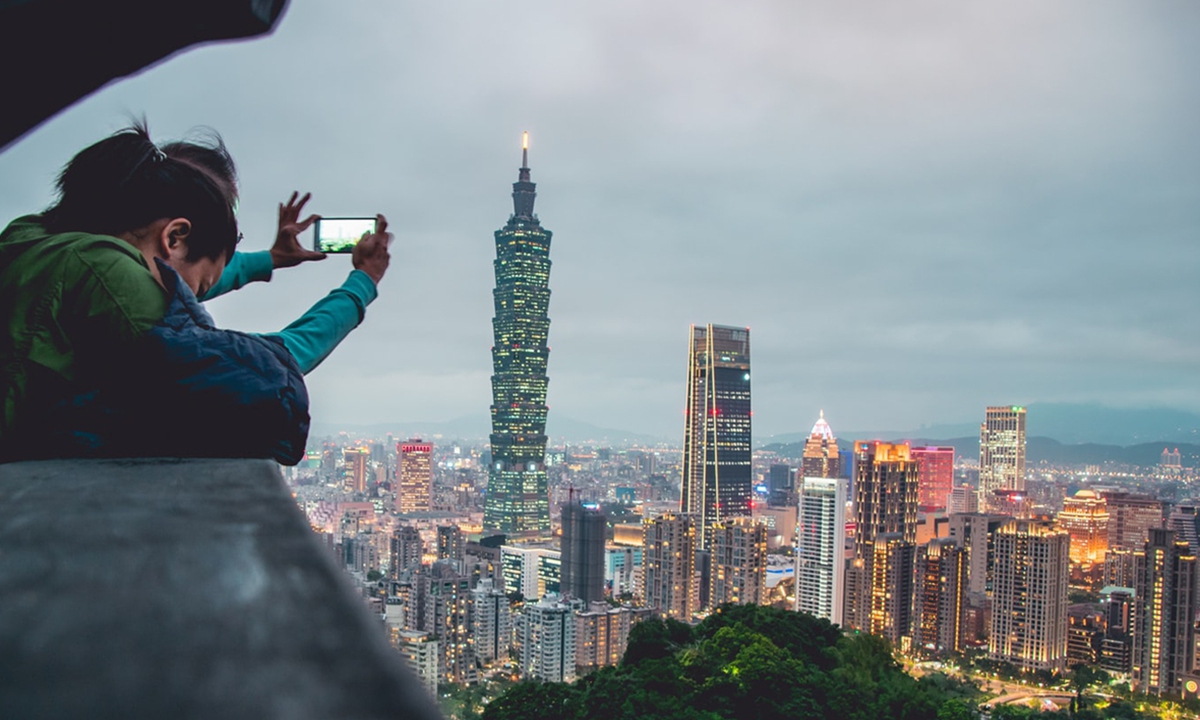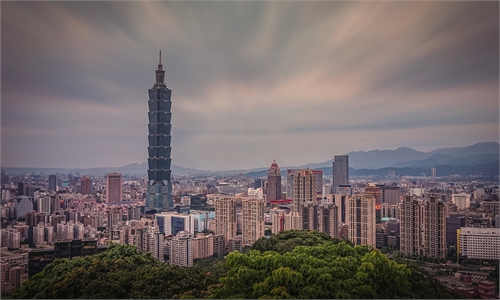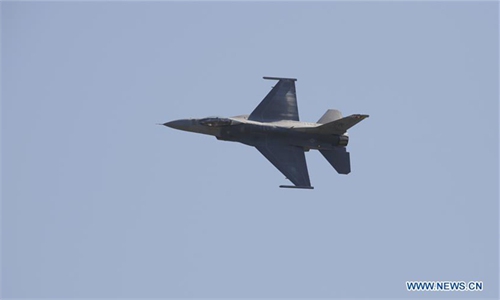DPP shutting anti-secessionist TV station 'political suppression'
'Darkest time' for free speech due to political suppression

The view of Taipei Photo: VCG
The island of Taiwan is entering its "darkest time" for freedom of speech as media organizations, observers and ordinary people criticized Taiwan's regional authority, which decided to suspend the operation of a TV station that has an anti-secessionist stance — a move observers described on Thursday as being vindictive, dictatorial and politically motivated.
The "national communications commission" (NCC) administered by Taiwan's Democratic Progressive Party (DPP) authority on Wednesday announced that all of its seven members had turned down CTiTV's request to renew its license, which is set to expire on December 11.
CTiTV, or CTi News, is known for its anti-secessionist stance. It is the first TV station to face rejection of its renewal since the NCC was founded in 2006, and it's been given ambiguous reasons like "serious violation of rules," "failure of internal control and self-discipline mechanism," Taiwan media reported.
CTiTV said issued a statement on Facebook, saying the day was the "darkest day" for freedom of expression and the press in Taiwan over the past three decades, as the NCC carried out the task as assigned by DPP leaders and the island's executive body.
After the suppression of CTiTV, Taiwan people should realize that the concept of "democracy and freedom" is the DPP's weapon in a political fight, not a value it firmly defends, analysts said.
Su Tseng-chang, the head of Taiwan's executive body, said on Thursday that he respected the NCC's decision. Su was on the Chinese mainland's "diehard Taiwan secessionists" blacklist, media reported.
CTiTV said that according to the standards of the NCC, all news stations in Taiwan should be shut down. It said it will seek legal remedies and fight to the end. However, analysts believe that it is almost impossible for the TV station to reverse the decision, as it can't win a game when the referees are all from the opposite team.
Chang Ya-chung, a Taipei-based political scientist and member of the Kuomintang (KMT) , told the Global Times that the DPP authority is abusing its power to retaliate against CTiTV for its supportive coverage of Han Kuo-yu, the KMT candidate who competed with Tsai Ing-wen in the 2020 Taiwan regional leadership election.
CTiTV does not get involved in any security issues, and the DPP's reasons for shutting it down are insufficient, causing cross-party discontent, said Chang.
According to an online poll of 18,000 Taiwan residents, 77 percent disagreed with the NCC's decision and more than 82 percent believed that politics lay behind the decision. Some 74 percent believed that denying the license renewal of CTiTV has a certain impact on freedom of speech and expression.
During the KMT's rule from 2008-16, it did not block any "pro-independence" media, Shaw Chong-hai, a columnist and former head of the school of social sciences at Chinese Culture University in Taiwan, told the Global Times.
Founded in 1994, CTiTV was originally called Chinese Television Network. CTiTV was backed by Want Want Holdings Ltd, a Taiwan-founded food manufacturer that has more than 100 factories on the Chinese mainland.
Shaw said that if any organization that has business on the mainland is punished, countless Taiwan businesses will suffer.
Mainland e-commerce giant Taobao's agent operator in Taiwan suspended its business in October as the DPP required the agent to be labeled as mainland-backed. Similarly, the agent for video platform iQiyi in Taiwan announced that it will stop services as the DPP banned agents from cooperating with mainland entities.
Although CTiTV can still broadcast its programs through online channels like YouTube, its audience is bound to shrink greatly, said observers.
Shutting down CTiTV is a loss for the public to hear diverse voices, and for media practitioners, a chilling effect is inevitable, said Shaw, noting that some scholars who are also involved in the media industry are worried and will "be careful about what to say."
Former Taiwan regional leader Ma Ying-jeou said on Wednesday that the DPP authority had resorted to all kinds of political tactics to bully its opponents and constantly restricted freedom of expression using excuses such as "security" and "safeguarding democracy," Taiwan media reported.
History will surely remember the dictatorship of Tsai and the DPP, said Ma.
People in Taiwan will protest against the DPP with anger, Shaw said, noting that the issue has been added to the agenda of a political rally scheduled for Sunday that aims to protest against the DPP authorities' import of problematic pork from the US.



